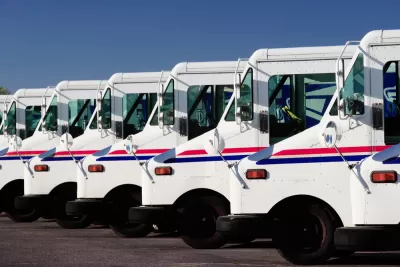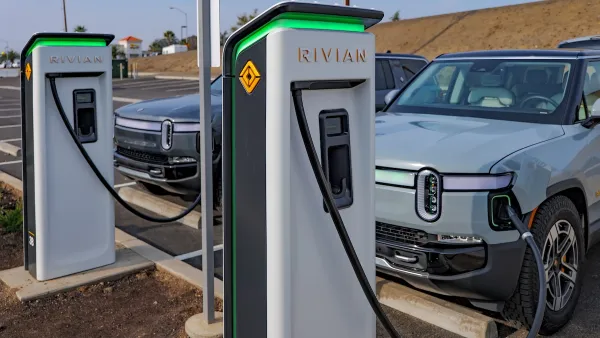In the wake of condemnation from environmental groups, the USPS revised its plan to replace its gas-powered fleet of trucks.

After receiving harsh criticism for its original plan to replace its fleet with primarily gas-powered trucks, the United States Postal Service is changing course, reports Gersh Kuntzman in Streetsblog USA. “According to a posting on the USPS website quietly uploaded [on Wednesday], the agency will raise the target percentage of new electric vehicles in the fleet from just 10 percent to 50 percent. And instead of rush purchasing 165,000 new “Next Generation Delivery Vehicles” — 90 percent of them gas-powered — the Postal Service will reduce its order to 50,000.”
The USPS blamed a lack of sufficient funding for its original plan. Environmentalists praise the changes, but argue that the agency needs to do more to reduce emissions. Kuntzman also notes that “The announcement by the Postal Service still ignores the potential of electric cargo bicycle and tricycle delivery, which studies show can slash emissions by roughly one-third compared to electric cargo vans, particularly in dense cities where mail routes are short.”
FULL STORY: Return to Sender: Postal Service Backtracks on Gas-Powered Truck Purchase

Planetizen Federal Action Tracker
A weekly monitor of how Trump’s orders and actions are impacting planners and planning in America.

Chicago’s Ghost Rails
Just beneath the surface of the modern city lie the remnants of its expansive early 20th-century streetcar system.

San Antonio and Austin are Fusing Into one Massive Megaregion
The region spanning the two central Texas cities is growing fast, posing challenges for local infrastructure and water supplies.

Since Zion's Shuttles Went Electric “The Smog is Gone”
Visitors to Zion National Park can enjoy the canyon via the nation’s first fully electric park shuttle system.

Trump Distributing DOT Safety Funds at 1/10 Rate of Biden
Funds for Safe Streets and other transportation safety and equity programs are being held up by administrative reviews and conflicts with the Trump administration’s priorities.

German Cities Subsidize Taxis for Women Amid Wave of Violence
Free or low-cost taxi rides can help women navigate cities more safely, but critics say the programs don't address the root causes of violence against women.
Urban Design for Planners 1: Software Tools
This six-course series explores essential urban design concepts using open source software and equips planners with the tools they need to participate fully in the urban design process.
Planning for Universal Design
Learn the tools for implementing Universal Design in planning regulations.
planning NEXT
Appalachian Highlands Housing Partners
Mpact (founded as Rail~Volution)
City of Camden Redevelopment Agency
City of Astoria
City of Portland
City of Laramie





























